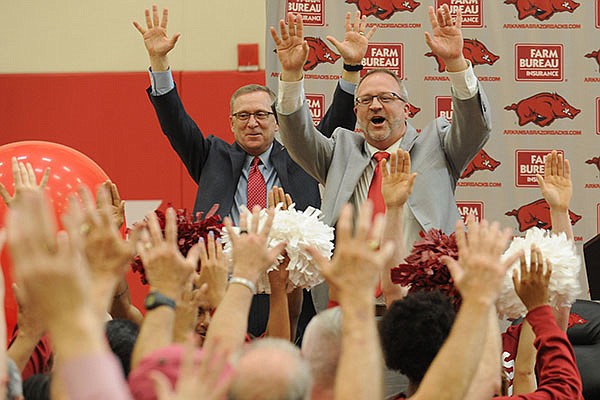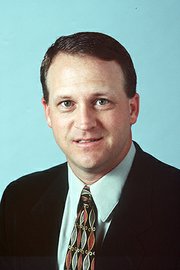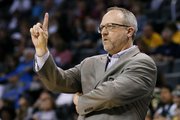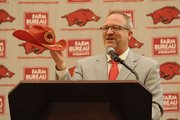FAYETTEVILLE — When Mike Neighbors was officially introduced as Arkansas’ ninth women’s basketball coach, he compared the ceremony to a wedding.
On one side were family members, friends and high school classmates, many of whom made the drive from Neighbors’ hometown of Greenwood, a thriving small community in Sebastian County, Arkansas, a little more than an hour south of Fayetteville.
On the other side were high school coaches and administrators who once were colleagues as Neighbors climbed alongside them the ladder through the Arkansas high school coaching ranks.
His return to Arkansas allowed him to finally unite his family and his work in the “dream job,” as he so often referred to the position both before and after his hire.
The move didn’t make sense to many. Neighbors had made three straight NCAA Tournaments at Washington, where he coached the Huskies to the 2016 Final Four and had coached the consensus national player of the year.
Washington regularly played in front of large crowds and is considered a “top 10 job in the country,” said Gary Blair, the Texas A&M and former Arkansas coach who was one of Neighbors’ mentors. The Razorbacks, on the other hand, are coming off a season in which they finished last in the 14-team SEC, played in front of crowds measured in the hundreds and have made two NCAA Tournaments in the past 14 years.
But it wasn’t the first time Neighbors made a career choice that appeared puzzling on the surface. To understand why Neighbors took a risk, you have to understand his past, his personality and love for all things Arkansas.
Boy from Greenwood
Neighbors was born in Greenwood in 1969, a year after an F4 tornado leveled much of the town, killing 14, injuring more than 200 and destroying scores of homes and businesses.
It was in an environment of rebuilding that Neighbors grew up — a process he has repeated multiple times throughout his professional career and one he now faces at his alma mater.
Longtime Greenwood High School principal Jerry Efurd remembers Neighbors as someone who always showed ambition that stood out among his peers.
“Mike had an enthusiasm about him that was just contagious,” Efurd said. “He was very energetic and very positive; just a good guy to feed off of, and other kids did.
“But he was a fierce competitor and I enjoyed watching him compete. A few years later, I opened a health club and started an adult basketball league, and the first one to sign up was Mike Neighbors. He was always the first one to line up when there was a little competition.”
Neighbors played several sports growing up, including football, basketball, baseball and tennis. He said his football career ended in eighth grade when he was hit hard by an Alma linebacker named Shannon Spangler.
“He hit me one time and I quit,” Neighbors said. “That’s a fact. I didn’t like football very much.”
Spangler’s daughter, Grayce, is a senior at Fayetteville High School and is signed to play for the Razorbacks in Neighbors’ first year.
“Isn’t that crazy?” Neighbors said.
The only state championship Neighbors won in high school was in competitive mime. He was roped into it when he took a forensics class.
“I thought it was going to be CSI-type stuff, but I found out forensics is the study of public speaking and debate,” Neighbors said. “I tried to get out of it, but my uncle, who was the assistant principal at the high school, wouldn’t let me. It turned out to be the best thing for me to get me over my fear of public speaking.
“I’m glad there weren’t any camera phones back then, though. I don’t think any videos exist.”
Neighbors helped his basketball team to a couple of conference championships, but it appeared baseball might take him farthest. He played middle infield for Westark Community College (now the University of Arkansas-Fort Smith) and tried to walk on for Norm DeBriyn when he transferred to Arkansas in 1989, the fall after DeBriyn’s last of four trips to the College World Series.
“Coach DeBriyn was really nice about it, but I was out of talent,” Neighbors said.
Although out of athletics, Neighbors stayed competitive in Fayetteville. One of his most treasured possessions is a photo of his intramural team posing on the Razorback Stadium field after they won a football championship. He also continued to play basketball, which was his passion.
He graduated from Arkansas in 1993 and by 1994 had already been hired as the head girls basketball coach at Bentonville High School. His team went 1-24 the first season but advanced to the state championship game two years later.
Rickey Smith, the longtime head girls coach at Fort Smith Northside, said he doesn’t remember any games against Neighbors’ teams as much as he remembers coaching against Neighbors.
“I had just gotten to Northside and he had just gotten to the Bentonville, and both programs were struggling a little bit,” Smith said. “At the end of the first period, they hit a shot that I was assuming went in, but the referees waved it off. It was a close ballgame and we hit a shot at the end of the third period that I thought was after the buzzer and they counted it. Lo and behold, they come down at the end of the game and make a shot, but the referees said it was after the buzzer. Three calls could have gone either way and he lost all three of them, so I was thinking, ‘This is going to be an awkward handshake.’
“But Mike, being the professional he is, shook my hand and said, ‘Give me 10 minutes and I’ll meet you in the office and we’ll go over our scouting report for the next game,’ because we helped each other scout opponents. That’s something I always appreciated about Mike was his professionalism.”
Neighbors left Bentonville for Cabot in 1998, but has remained friends with Smith and several other high school coaches in the area.
“Every step of the way, we’ve maintained the same level of friendship and contact as we did when he was a high school coach,” Smith said. “Every time he was getting ready to load a plane to head from one college job to another, he called.
“There’s not a high school coach in the state that doesn’t have some kind of connection with Mike, either through his 70,000-plus newsletter or through him speaking at clinics. This is the first Arkansas coach that has been in our shoes. He’s been in our seats, he’s been in our conference, he’s been in our conference coaches meetings. Do we want to see him succeed? Yeah, absolutely. We want to help him all we can.”
Health Scare, First Break
Neighbors was coaching at Cabot when, at 29, he suffered a heart attack following a team practice.
“My daughter was 3 and asleep on my chest when I started having chest pains,” Neighbors said. “I thought it was probably something from exertion or I had some Polish sausage or whatever.
“It turned out to be a little bit of a genetic defect. I had surgery on Tuesday and coached the next Friday. You blow an ACL, you’re out for 12 months, but have a heart attack and you’re back the next week.”
When the heart attack didn’t take his life, he let it transform him. He decided to do whatever it took to reach his dream: coaching women’s college basketball.
Following the season, he left his $72,000 per year position at Cabot to take a $14,000 per year job as the first women’s basketball director of operations at Arkansas.
“It was $583 a month bring home,” he said. “I’ll never forget that number. I was making almost four figures.”
Neighbors had his Cabot team at an Arkansas team camp when he interviewed for the job.
“I had a 10 a.m. game and a 3 p.m. game, and I literally went up between games and interviewed, and Gary Blair offered me the job,” Neighbors said. “Then he spent the next two hours trying to talk me out of taking it. There obviously was a tremendous pay cut involved.
“It was risky, it was scary and it probably didn’t make a lot of logical sense.”
Neighbors took it because he knew it was his best opportunity to get into college basketball. He had applied for “every job on the Internet” beforehand, which in the late ’90s didn’t mean a whole lot. Among the schools that turned him down were Colorado School of the Mines and Lyon College in Batesville.
Arkansas was a year removed from the Final Four and the opportunity to learn from Blair was too good to pass up. But at first, there wasn’t a lot of learning.
“That first couple of weeks, I was Gary Blair’s Diet Coke guy,” Neighbors said. “That’s literally what I did: made sure he had his Diet Coke at practice.
“But when I got into the college game, I didn’t want to learn from a thousand people; I wanted to learn from Gary Blair.”
Blair said he “probably threw a little Title IX at Arkansas” to create a position for Neighbors. Wayne Stehlik had been a director of operations on Nolan Richardson’s men’s staff for several years and Blair wanted someone to relieve some administrative duties from him on the women’s side.
What wasn’t thought out was exactly how Neighbors would fit with the staff of assistant coaches. Neighbors was a basketball junkie and wanted to help, but he wasn’t well received at first.
“Vic Schaefer and I got off to a rocky start,” said Neighbors, referencing the longtime Arkansas assistant who this year coached Mississippi State to a national runner-up finish. “I think Vic wanted somebody else to be hired to the position and I still remember our first conversation. I asked Vic, ‘What do you need?’ and he said, ‘I’m never going to need anything from you. You’re never going to work anything, I’m never going to ask you for help with anything and just stay over there in your office.’
“A month later, I was in his office helping him break down film, I was at his house putting up his kids’ swing set; we became not only co-workers, but really good friends. It got to the point that when his mother was sick in the hospital, I talked to him every night for four months on his drive from College Station to Houston. I was the only person who was up, so I would literally talk to him from the time he pulled out of the driveway to the time he pulled in the hospital. We did that, I think, for 57 straight days.”
The nostalgia surrounding that era has increased as those associated it have won elsewhere. Blair won a national championship at Texas A&M, while Schaefer and Neighbors each coached in Final Fours. Even Arkansas players from the era have had success at other colleges, such as Sytia Messer, who is an assistant coach and recruiting coordinator at Baylor.
“I was just in the right place at the right time,” Neighbors said.
With Blair as a reference, Neighbors landed his first full-time college assistant gig at Tulsa in 2001. He bounced around the next decade as an assistant at five colleges, including back at Arkansas in 2006-07. It was a short-lived return home when head coach Susie Gardner, Blair’s successor, was fired following the season.
He left Arkansas for Kevin McGuff’s staff at Xavier, where he suffered a second heart attack during a practice. Neighbors followed McGuff to Washington in 2011.
At all of his stops, Neighbors proved himself to be a dynamic recruiter, helping land nine McDonald’s All-Americans.
“There is no question in mind that with Mike’s magnetic personality, his enthusiasm and his endless energy, that he is a person that athletes connect with,” Efurd said.
Smith, who has won six state championships at Northside, has had several players recruited by Neighbors.
“One year, we were playing in the Nike Tournament of Champions,” Smith said. “He ended up with the same tickets, the same airline, same time as us and was sitting next to us on our way back from Phoenix. He does his homework.”
Blair said he saw signs of Neighbors’ recruiting ability in those years as director of operations.
“He would always work my camps and he knew more about recruiting and what was going on than a lot of my assistants at the time,” Blair said. “I just said I’m going to keep my eye on him and watch him grow.”
Making a Name
Neighbors’ big break came in 2013 when, in a foreshadowing of events to come, McGuff left Washington for his alma mater, Ohio State.
Washington interviewed only two people and Neighbors was hired over another assistant coach who remained on his staff. The decision to hire Neighbors was made to create some stability within a program that had four coaching changes in six years.
Like at Arkansas two decades earlier, Neighbors was in the right place at the right time. His first class as a head coach was one he helped sign that included two players, Kelsey Plum and Chantel Osahor, who would eventually become All-Americans. Plum went on to set the NCAA career scoring record, was a consensus national player of the year as a senior and the No. 1 pick in the 2017 WNBA Draft.
As juniors, Plum and Osahor, along with Neighbors, led Washington on a memorable run through the NCAA Tournament. The Huskies entered the tournament as a No. 7 seed with a 22-10 record after a fifth-place finish in the Pac-12.
But Washington rolled through the first four rounds, upsetting No. 2, 3 and 4 seeds Maryland, Kentucky and Stanford by a combined 31 points. The wins over Maryland and Kentucky came on their home floors.
“When he surfaced up there, that was just the talk of the town,” said Efurd, the Greenwood principal. “When they had that success, people just said, ‘I knew Mike was different and I’m not surprised at all.’”
Washington’s run ended with a blowout loss to Syracuse in the Final Four, but it created a buzz around the program in Seattle.
The Huskies dominated much of their 2016-17 regular season with a 27-4 record. Washington won its first two NCAA Tournament games over Montana State and Oklahoma by 28 and 26 points, but the season ended when the Huskies ran into Schaefer’s upstart Mississippi State team and lost 75-64 in the Sweet 16 in Oklahoma City.
Arkansas athletics director Jeff Long was there that night and approached Neighbors in a move expected for two weeks after Jimmy Dykes resigned as the Razorbacks’ coach.
“We were on the bus on the way to play Oregon and Chantel, who is as basketball-savvy as any 21-year-old kid I’ve ever been around, comes from the back of the bus and showed me a tweet about it,” Neighbors said of when he learned the Arkansas job was open. “From that point on it was like, ‘His dream job’s open.’
“We were still in the thick of it, but you can’t be a head coach if you can’t multitask and focus on a few things at once.”
When Neighbors was hired at Washington, a Seattle Times reporter asked him if he had landed his dream job.
“I said, ‘No, Arkansas will always be my dream job,’” Neighbors said. “I had been honest with everybody about that, and those kids.”
So when Dykes resigned following the team’s 11th straight loss to end the season, news reports in Washington and Arkansas quickly tied Neighbors back to his home state. He had interviewed with Long in 2014, but was passed over for Dykes, a college basketball analyst at ESPN and fellow Arkansas graduate.
“I didn’t have a full year of experience,” Neighbors said of the 2014 interview. “We were in the WNIT and at that point I was telling the committee what I thought I could do … Quite frankly, I don’t know if I could have done it. I’d like to believe we could have, but I don’t know. I made a lot of mistakes in the process that if I had made them here, it might not have worked.”
When Long approached Neighbors the next time around, neither had any doubt he was ready.
“It was a matter of minutes,” Neighbors said when asked how long it took him to accept the job. He signed his contract at 3 a.m.
“I had been approached about other jobs, but it was a non-starter,” Neighbors said. “A, they weren’t my dream job and B, I didn’t want to leave those kids.
“I told my (Washington) team, ‘I didn’t take the Arkansas job today or yesterday; I took this job when I was 10 years old.’ If I had been offered the job, I was taking it. It was a matter of did I have what they were looking for.”
Finally Home
On April 4, Neighbors was officially introduced in front of a packed crowd on the women’s practice court inside the Razorbacks’ basketball facility across the street from Bud Walton Arena.
With his grandfather’s Razorback hat in one hand and a book signed by Frank Broyles in the other, Neighbors recalled his favorite memories sports memories — Roland Sales’ MVP performance in the Orange Bowl, U.S. Reed’s half-court shot to beat Louisville in the NCAA Tournament and Scotty Thurman’s 3-pointer to beat Duke in the national championship game.
“I remember where I was for all those,” said Neighbors, who admitted he cried when Arkansas lost “until an embarrassing age.”
Among the family with Neighbors that day was his daughter, Abby, and son, Alec. Neighbors and their mother divorced and they grew up in Rogers. His daughter now is a junior at Arkansas.
“It was a factor,” said Neighbors, who noted he left “10 other daughters” behind as players at Washington.
Also in attendance was Neighbors’ mother, who still lives in Greenwood and who already has received multiple visits home from her son. He plans to go back in May as the keynote speaker at the high school graduation.
Neighbors is balancing family and work the way he always wanted.
“There are a lot of times when coming home could bury somebody, because your emotions are such that you may be making an emotional decision that overrides a career decision,” Efurd said. “I don’t think that’s the case with Mike. He definitely has a number of reasons to come back to Arkansas.”




